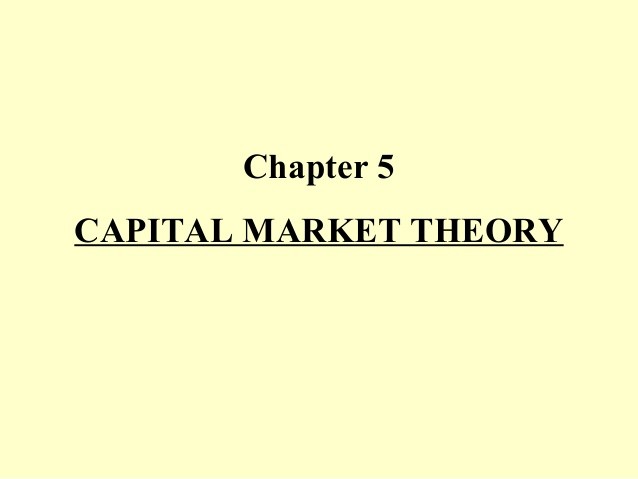Capital Market Theory
Post on: 22 Июнь, 2015 No Comment

Capital Market Theory tries to explain and predict the progression of capital (and sometimes financial) markets over time on the basis of the one or the other mathematical model.Capital market theory is a generic term for the analysis of securities.
In terms of trade off between the returns sought by investors and the inherent risks involved, the capital market theory is a model that seeks to price assets, most commonly, shares.
In general, whenever someone tries to formulate a financial, investment, or retirement plan, he or she (consciously or unconsciously) employs a theory such as arbitrage pricing theory, capital asset pricing model, coherent market hypothesis, efficient market hypothesis, fractal market hypothesis, or modern portfolio theory.
The most talked about model in Capital Market Theory is the Capital Asset Pricing Model.
In studying the capital market theory we deal with issues like the role of the capital markets, the major capital markets in the US, the initial public offerings and the role of the venture capital in capital markets, financial innovation and markets in derivative instruments, the role of securities and the exchange commission, the role of the federal reserve system, role of the US Treasury and the regulatory requirements on the capital market.
The Capital Market Theory deals with the following issues:
- Importance of venture capital in the capital market
- Initial public offerings
- Role of capital market
- Major capital markets worldwide
- Markets and financial innovations in derivative instruments
- Role of Federal Reserve System
- Role of securities
- Capital market regulatory requirements
- Role of the government treasury
Assumptions of Capital Market Theory
The capital market theory builds upon the Markowitz portfolio model. The main assumptions of the capital market theory are as follows:
1.All Investors are Efficient Investors: Investors follow Markowitz idea of the efficient frontier and choose to invest in portfolios along the frontier.
2.Investors Borrow/Lend Money at the Risk-Free Rate: This rate remains static for any amount of money.
3.The Time Horizon is equal for All Investors: When choosing investments, investors have equal time horizons for the chosen investments.
4.All Assets are Infinitely Divisible: This indicates that fractional shares can be purchased and the stocks can be infinitely divisible.
5.No Taxes and Transaction Costs: It is assumed that investors results are not affected by taxes and transaction costs.
6.All Investors Have the Same Probability for Outcomes: When determining the expected return, assume that all investors have the same probability for outcomes.
7.No Inflation Exists: Returns are not affected by the inflation rate in a capital market as none exists in capital market theory.
8.There is No Mispricing within the Capital Markets: It is assumed that the markets are efficient and that no mispricings within the markets exist.
Mortgages, equities, bonds, and other investments are traded in the capital market. The financial instruments in this market have long maturity periods. Capital market theory states that federal funds, federal agency securities, treasury bills, commercial papers, negotiable certificates of deposits, repurchase agreements, Eurocurrency loans and deposits, options and futures are merchandised in the capital market. When one has to put a price on a security, one has to determine the risk and return of the security both for single assets, as well as a portfolio of assets. The uncertainty and variability of returns on assets and the possibilities of losses can be defined as risks. The theory of capital market defines returns in the following manner:
K = Pt + Ct — Pt-1 / Pt-1
Where the time of purchase of the asset of price Pt-1 is t-1. If this be the case, then the return (K) from the time period t-1 to t is the above mentioned formula. Ct is the cash gotten from assets between t-1 and t. Pt is the price of the asset at time t.
For practitioners of the capital market theory. it has not lost its significance. It is still as important for retirement, financial, and investment plans.
More Information in Capital Market














